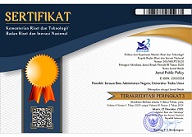Innovation in Sugihwaras Village, Sidoarjo District as A Smart Village Based on Government Policy
Abstract
This research aims to analyze and describe the innovation of Sugihwaras Village, Sidoarjo Regency as a smart village based on government policy. The research method uses descriptive with a qualitative approach. Data collection techniques were conducted through interviews, observation, and documentation. The results show that the smart village in Sugihwaras Village is in the form of government administration system applications and public services made by village officials, computer training for underprivileged village children, integrated landfill management, eco-enzyme training, and adequate access to education, health, and information technology. The implementation of smart economy in Sugihwaras Village is still not evenly felt. Innovation in Sugihwaras Village is supported by the leadership of the village head who is sensitive to the condition of children in Sugihwaras Village. Culture is also an important factor in innovating in Sugihwaras Village, namely care and excellent service. The ability to innovate is that the teachers who are village officials and the Village Community Empowerment Agency have qualified skills in the computer field. The work team is still within the scope of village officials and village institutions, but will work with Muhammadiyah Sidoarjo University in providing certification. The performance of the village government in the Griya Sinau Digital (GSD) program is that training participants have increased and some participants have found jobs.
Keywords
Full Text:
PDFReferences
Albury, D. (2003). Inovasi di Sektor Publik. PT Elex Media Komputindo.
Budhirianto, S. (2010). Efektivitas E-Government Dalam Melaksanakan Fungsi Pelayanan Publik di Provinsi Jawa Barat dan Banten. Jurnal Penelitian Komunikasi, 13(2), 55–70.
Fatmawati, F. (2011). Kemitraan Dalam Pelayanan Publik: Sebuah Penjelajahan Teoritik. Otoritas: Jurnal Ilmu Pemerintahan, 1(2).
Giffinger, R., Fertner, C., Kramar, H., Kalasek, R., Pichler-Milanovic, N., & Meijers, E. J. (2007). Smart cities. Ranking of European medium-sized cities. Final Report.
Herdiana, D. (2019). Peran masyarakat dalam pengembangan desa wisata berbasis masyarakat. Jurnal Master Pariwisata (JUMPA), 6(1), 63–86.
Isnaningtyas, Y., & Marlina, N. (2017). Analisis kemitraan dalam pengelolaan Desa Wisata Kandri Kecamatan Gunungpati Kota Semarang. Journal of Politic and Government Studies, 6(03), 551–560.
Miles, M. B., Huberman, A. M., & Saldana, J. (2014). Qualitative data analysis: A methods sourcebook.
Muazir, S., Muhammad, N., & Muhammad, R. A. (2021). Measuring & Evaluating A Competitive & Smart Border Village in West Kalimantan Indonesia. Journal of Urban Culture Research, 22, 145–165.
Mustakim, M. Z. (2015). Kepemimpinan Desa. Jakarta, Kementerian Desa PDTT RI.
Nurgiarta, D. A., & Rosdiana, W. (2019). Pemberdayaan masyarakat melalui program inovasi desa (PID) di Desa Labuhan Kecamatan Brondong Kabupaten Lamongan. Publika, 7(3).
Nurwanda, A., & Badriah, E. (2020). Analisis Program Inovasi Desa Dalam Mendorong Pengembangan Ekonomi Lokal Oleh Tim Pelaksana Inovasi Desa (Pid) Di Desa Bangunharja Kabupaten Ciamis. Dinamika: Jurnal Ilmiah Ilmu Administrasi Negara, 7(1), 68–75.
Saleh, C., & Ibad, S. (2022). ANALYSIS OF PUBLIC SERVICES INNOVATION SMART KAMPUNG BANYUWANGI MODEL IN THE PERSPECTIVE OF PUBLIC SERVICE MANAGEMENT. Journal of Southwest Jiaotong University, 57(1).
Siagian, S. P. (1998). Kepemimpinan, Organisasi dan Manajemen. Penerbit Masagung, Jakarta.
Subekti, T., & Damayanti, R. (2019). Penerapan model smart village dalam pengembangan desa wisata: Studi pada desa wisata boon pring sanankerto turen kabupaten malang. Journal of Public Administration and Local Governance, 3(1), 18–28.
Sugiyono, P. D. (2017). Metode Penelitian Bisnis: Pendekatan Kuantitatif, Kualitatif, Kombinasi, dan R&D. Penerbit CV. Alfabeta: Bandung.
Taufiq, O. H., Yuliani, D., & Hermawandi, D. (2019). Tata Kelola Pemerintah Desa Berbasis E-Government Menuju Good Governance. Dinamika: Jurnal Ilmiah Ilmu Administrasi Negara, 6(1), 145–152.
Waluyo, R., Setyaningsih, G., & Kholil, M. (2019). Analisis Literasi Internet pada Aparatur Desa dengan Konsep Personal Capability Maturity Model (P-CMM)(Studi Kasus: Kecamatan Randudongkal). Journal of Innovation Information Technology and Application (JINITA), 1(1), 8–15.
Wibowo, S. E., & Phil, M. (2007). Manajemen Kinerja edisi tiga. Jakarta: PT. Raja Grafindo Persada.
DOI: https://doi.org/10.35308/jpp.v9i2.5971
Refbacks
- There are currently no refbacks.
Copyright (c) 2023 Monicha Puspitasari , Jusuf Irianto, Sulikah Asmorowati, Mira Aulia
p-ISSN: 2477-5738 I e-ISSN: 2502-0528 I DOI: 10.35308
Jl. Alue Peunyareng, Ujong Tanoh Darat, Meureubo, Kabupaten Aceh Barat, Aceh 23681, Indonesia
(0655) 7110535 l +621260313742 l +6285277110911
 is licensed under a Creative Commons Attribution-ShareAlike 4.0 International License
is licensed under a Creative Commons Attribution-ShareAlike 4.0 International License


